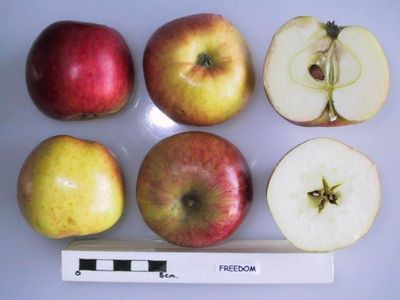What are Freedom Apples?
Freedom is a variety of apple that was developed in the 1950s by the New York State Agricultural Experiment Station. It was created to be resistant to a number of diseases, like apple scab, cedar apple rust, powdery mildew, and fire blight. This is an especially good choice for your yard if you have struggled with these particular diseases in the past. Growing Freedom apples does require a pollinator. Good choices are Liberty, Cortland, UltraMac, and Starskpur. The Freedom apple tree is cold hardy and grows well in zones 4 through 8. It is a pretty tree with a good spreading shape. The apples themselves have a good flavor. They are large, round and bright red with a creamy flesh and ripen between late September and early October. Freedom apples are great for eating fresh, for cooking, and for drying.
How to Grow a Freedom Apple Tree
When growing a Freedom apple tree, make sure you find the right space for it. Your tree will grow between 12 and 15 feet (3.5 to 4.5 m.) tall and wide, and it needs a half to a full day of sun. The soil should be well-drained, and the spot you choose should not be too far from the cross-pollinating tree. Once established, Freedom apple tree care is much like that of other apple trees. Your tree will need a little nitrogen-heavy fertilizer once it starts to bear fruit, which should be within two to five years for Freedom. Prune the apple tree at least once a year for more vigorous growth and consider thinning the fruit a few weeks after full bloom to get better quality apples. Only water your tree if rainfall isn’t providing an inch (2.5 cm.) every week or so. As for pests and diseases, you shouldn’t have to take much care. Watch out for pests and signs of infestations, but Freedom is largely resistant to the most problematic diseases of apple trees.
